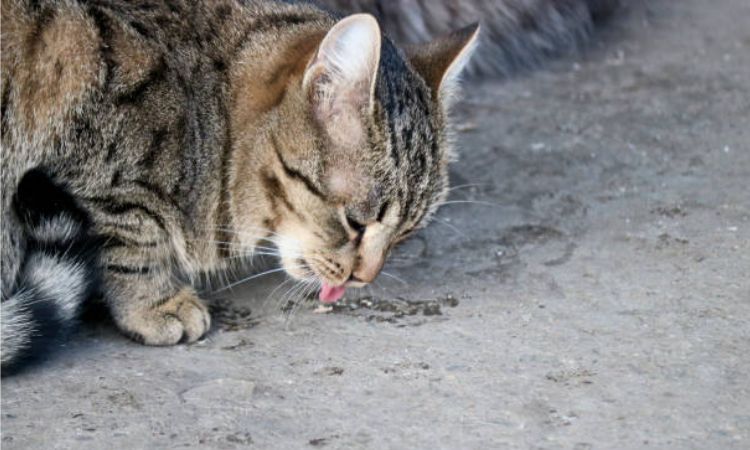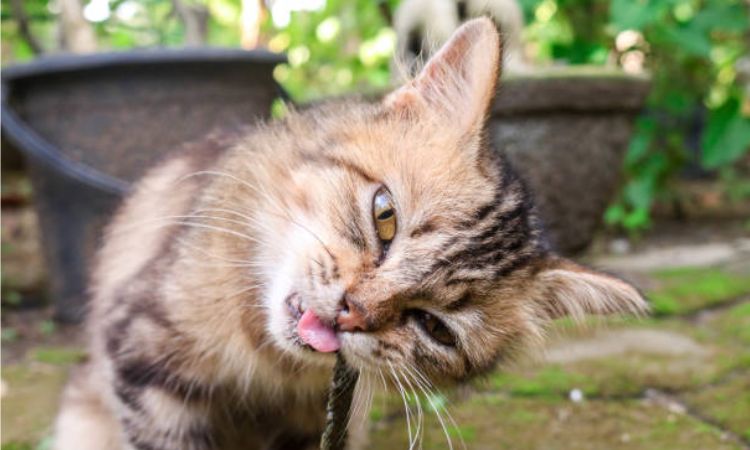Bringing a new kitten home is exciting, but it comes with its share of responsibilities—especially when it comes to their health. One of the first stops on their wellness journey is the vet, where they’ll get a full check-up and often their first round of deworming.
But what if, after this routine treatment, you notice your kitten vomiting worms? Understanding why this happens and how to respond is key to keeping your furry friend safe and healthy.

Why Do Cats Vomit Worms After Deworming?
When a cat is given a deworming treatment, the medication works by targeting the worms living in their intestines. Most modern dewormers paralyze or kill the worms, preventing them from clinging to the intestinal walls. Once immobilized, the worms are naturally expelled from the body, usually through the feces. However, in some cases—especially if the worms are very large or if the cat’s stomach is sensitive—they may be vomited instead.
The types of worms commonly found in cats include roundworms, tapeworms, and hookworms. Of these, roundworms are the most frequently seen in vomit due to their size and length, sometimes resembling spaghetti. Tapeworms are less likely to be vomited as they are segmented and tend to stay attached to the intestinal lining. Hookworms are small and usually pass unnoticed in the feces rather than appearing in vomit.
Vomiting worms after deworming is generally a sign that the medication is working effectively. It is important to monitor your cat’s overall condition and ensure they stay hydrated, especially if vomiting is accompanied by mild stomach upset. In most cases, once the worms are expelled, your cat should recover quickly without further issues.
Is It Normal for Cats to Vomit Worms Post Deworming?
It can be alarming to see worms in your cat’s vomit, but this is sometimes a normal response shortly after deworming. Most deworming medications work by paralyzing or killing intestinal worms, which are then expelled from the body. While the majority of worms are usually passed in the stool, it is not uncommon for some to be vomited, especially within the first few hours to a couple of days after treatment.
Vomiting worms is generally less frequent than seeing them in feces, and any worms expelled after this initial period are typically dead. If vomiting persists, or your cat shows other signs of illness such as lethargy, refusal to eat or drink, or repeated vomiting, you should contact your veterinarian promptly.

How Long Will My Cat Vomit Worms After Deworming?
In most cases, cats that vomit worms after deworming do so within the first 24 to 48 hours following treatment. The duration and intensity of vomiting can vary depending on several factors, including the severity of the worm infestation, the type of worms involved (roundworms, tapeworms, or hookworms), and the specific deworming medication used.
While brief episodes of vomiting worms are normal, persistent vomiting beyond a couple of days may indicate a heavier infestation, a reaction to the medication, or an underlying health issue. If your cat continues to vomit worms or shows other concerning symptoms such as lethargy, refusal to eat or drink, or repeated vomiting, it is important to contact your veterinarian for guidance and possible follow-up treatment.
Potential Side Effects of Deworming in Cats
While deworming is generally safe, some cats may experience temporary side effects.
Mild and Common Reactions
- Vomiting or occasional diarrhea
- Lethargy or lower energy than usual
- Slight changes in appetite
These mild symptoms usually resolve on their own within a day or two and indicate that the medication is working to eliminate parasites.
Severe or Concerning Reactions
- Persistent or repeated vomiting
- Blood in vomit or stool
- Extreme weakness or collapse
- Signs of an allergic reaction (swelling, hives, difficulty breathing)
If any of these severe symptoms occur, contact your veterinarian immediately.
Important Note: Most cats tolerate deworming medications well, and serious side effects are rare. Regular monitoring after treatment ensures your cat stays safe and comfortable.
What to Do If Your Cat Vomits Worms After Deworming
Seeing worms in your cat’s vomit after deworming can be unsettling, but it’s often a sign that the medication is doing its job. Here’s how to respond safely and effectively:
- Stay Calm: Vomiting worms is usually normal within the first 24–48 hours after treatment, especially if the worms are roundworms, tapeworms, or hookworms. This is generally not a cause for panic.
- Provide Water and Comfort
- Ensure your cat has access to fresh water at all times.
- Offer a quiet, comfortable space for rest.
- Small, bland meals can help if your cat’s appetite is reduced.
- Monitor for Additional Worms or Symptoms
- Keep an eye out for repeated vomiting, diarrhea, lethargy, or signs of dehydration.
- If severe or persistent symptoms occur, contact your veterinarian promptly.
- Dispose of Expelled Worms Safely
- Use gloves to handle vomit or stool containing worms.
- Seal in a plastic bag and dispose of in the trash to prevent reinfestation.
- Clean and disinfect litter boxes, bedding, and food bowls thoroughly.
By following these steps, you can help your cat recover comfortably while ensuring your home stays safe from reinfection.

When to Contact a Veterinarian
While vomiting worms after deworming is often normal, there are situations where you should seek veterinary advice promptly:
- Worms Persist Beyond the Expected Timeframe: If your cat continues to vomit or pass worms more than 48 hours after treatment, it could indicate a heavy infestation, incomplete deworming, or resistance to the medication.
- Severe Side Effects or Signs of Illness: Contact a vet if your cat shows persistent vomiting, diarrhea, lethargy, dehydration, blood in vomit or stool, or extreme weakness. These may signal complications that require immediate attention.
- Recurring Infestations Despite Treatment: If worms reappear after completing a deworming course, this may suggest reinfection, an underlying health issue, or the need for a different medication.
Different parasites (roundworms, tapeworms, hookworms, etc.) may require different medications. If you’re unsure about the type of worm or the appropriate deworming regimen, a veterinarian can provide testing, accurate identification, and tailored treatment.
When a cat throws up worms after deworming, it’s a clear sign the medication is doing its job. Although it can be unsettling to see, this reaction is a normal and expected part of the process. If your cat seems to be otherwise healthy, there’s no need to worry. However, if the vomiting is severe or if you notice other concerning symptoms, it’s always best to consult with your veterinarian.






